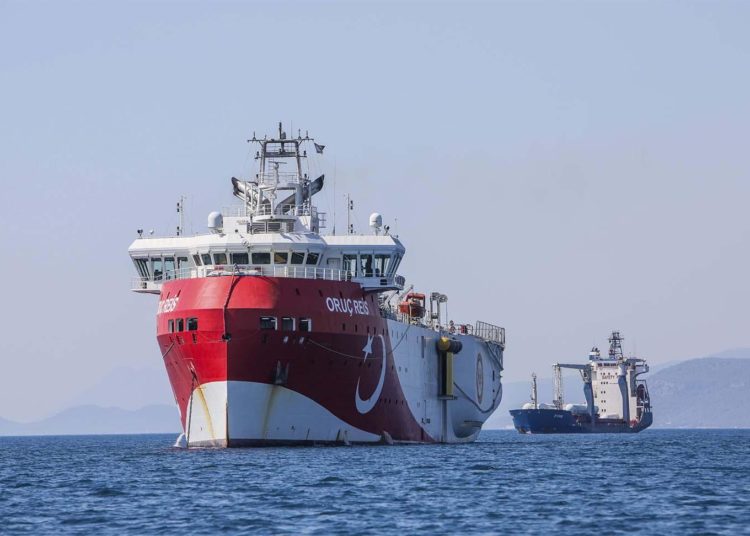Nordic Monitor
Turkey suspended its research plans for oil and gas exploration in the eastern Mediterranean following a US-Greece joint naval exercise with the participation of elements of the US 6th Fleet. The US intervention in the crisis has triggered a new dialogue between Turkey and Greece.
The Dwight D. Eisenhower (IKE) Carrier Strike Group (CSG) took part in naval surface exercises with the Hellenic Navy in the eastern Mediterranean from July 24 to 28, 2020. The CSG conducts operations in the US 6th Fleet area of operations in Europe and Africa.
The US State Department also urged Ankara on July 28 to cease drilling exploration plans off the Greek islands in the eastern Mediterranean and avoid raising tensions in the region.
The same day, Turkey announced it was suspending the gas and oil search of one of its vessels off a Greek island. The Oruç Reis planned to search for hydrocarbons “180 kilometers [110 miles] from the island of Meis [Kastellorizo in Greek],” İbrahim Kalın, presidential spokesman and chief adviser to Turkish President Recep Tayyip Erdoğan, told CNN-Türk.
Kalin emphasized the need for negotiations, saying bilateral issues with Greece should be resolved through dialogue rather than through threats to Turkey’s bid for European Union membership. “Despite this our president said while the negotiations are continuing, let’s be constructive and hold [the energy search] for a while. … We are ready to talk with without any conditions,” he said.
In Athens, Greek government spokesman Stelios Petsas welcomed Turkey’s decision. He described the latest research mission as “illegal” but added that he hoped the two countries could have substantive talks.

While visiting Turkish troops in Edirne, a province bordering Greece, Turkish Defense Minister Hulusi Akar confirmed that Turkey’s “dialogue with Greece will increase in the days ahead.”
“Regarding our activities here, troops here are very committed, extremely determined to protect and safeguard our nation’s rights. We think our dialogue with Greece will increase in the days ahead. We are waiting for a meeting. We believe that many problems can be solved by holding this meeting. Our work continues in this direction,” Akar stated.
Akar was accompanied by Chief of General Staff Gen. Yaşar Güler, Land Forces Commander Gen. Ümit Dündar, Air Forces Commander Gen. Hasan Küçükakyüz and Naval Forces Commander Adm. Adnan Özbal.

According to a US Naval Forces Europe-Africa announcement, the exercises “included formation steaming, tactical maneuvers, communications drills, and allowed participating forces to test and refine command and control between the two navies.”
“This opportunity flexed our ability to be postured with our NATO partners to be ready with credible force to assure, deter, and defend our interests in an increasingly complex security environment,” said Capt. Zoah Scheneman, commander, Destroyer Squadron 26.
Participating US units were Nimitz-class aircraft carrier USS Eisenhower, San Jacinto, Arleigh Burke-class guided-missile destroyer USS Truxtun and Aegean.

On July 21 Turkey issued a Navigational Telex (NAVTEX 977/20) about its search for oil and gas to the south and east of Meis/Kastellorizo, a Greek island located two kilometers off Turkey’s southern coast near the resort town of Kaş. A day later, another Navtex was issued by Greece in response to the advisory published by Turkey’s navy.
The area subject to Turkey’s Navtex falls under the continental shelf of Turkey and was notified to the United Nations, Turkish Foreign Ministry spokesperson Hami Aksoy said.
The naval and air forces from both countries were on standby after Ankara’s decision to send a research vessel escorted by naval ships to conduct oil and gas exploration.
As the tensions were rising, German Chancellor Angela Merkel intervened by holding phone calls with President Erdoğan and Greek Prime Minister Kyriakos Mitsotakis to prevent a possible military confrontation, the German newspaper Bild reported.
Turkey has accused Greece of trying to exclude it from the benefits of potential oil and gas finds in the Aegean Sea and eastern Mediterranean, arguing that sea boundaries for commercial exploitation should be divided and not include the Greek islands on an equal basis. Athens counters that Turkey’s position is a violation of international law.
Ongoing tensions between Greece and Turkey over a territorial dispute on offshore gas and oil claims in the eastern Mediterranean were further exacerbated after Turkey signed a maritime demarcation deal with Tripoli’s Government of National Accord (GNA) in November, 2019, aiming to give Turkey extended access for hydrocarbon drilling rights in the region.












